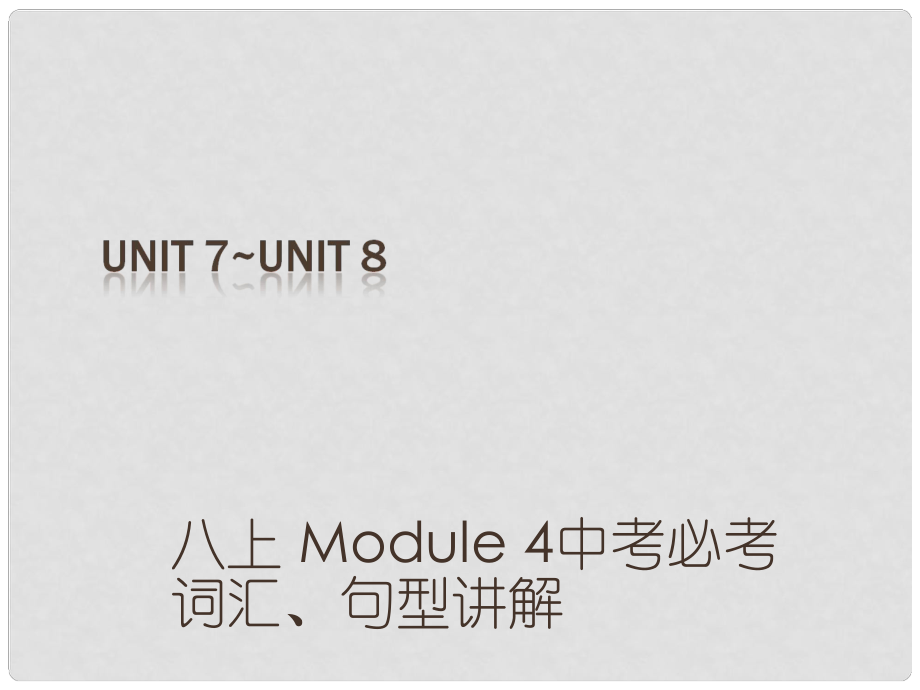《(深圳地區(qū))中考英語 課本梳理 八上 Unit 78復(fù)習(xí)課件》由會(huì)員分享���,可在線閱讀��,更多相關(guān)《(深圳地區(qū))中考英語 課本梳理 八上 Unit 78復(fù)習(xí)課件(15頁珍藏版)》請(qǐng)?jiān)谘b配圖網(wǎng)上搜索。
1�����、八上 Module 4中考必考詞匯��、句型講解worthspellingmemoryunlessloseimprovewalletbrainstepmanagerhidespeechconfidentlychooserichwheneverwinnercompetitionwholeelsetake outsomething newtake place/happenpour outwrite downturn/switch onlearn/know aboutwalk to sp.think ofhave a balanced dietin my opinion/I thinkabove all
2����、put on/act outin publicgive some advicebe careful/look outin Englishmore than/overhave/go on a picnictake part in/join in1. They have written the short articles below to help students improve their memory.(1) improve v. 提高; 改善 =makebetter/become better【同根詞】【同根詞】improvement n. 提高�����; 改善Li Mings English
3����、has got great improvement. 李明的英語取得很大提高��?!就卣埂俊就卣埂吭谟⒄Z中有部分動(dòng)詞在該動(dòng)詞后加后綴-ment變名詞:move v.移動(dòng)���; 搬動(dòng) movement n.感動(dòng) (2) memory n. 記憶�����; 記憶力 【同根詞】【同根詞】memorize v.記憶��; 記住 = remember 【拓展】【拓展】在英語中以y結(jié)尾的名詞將y改為ize變成動(dòng)詞:apology n.道歉 apologize v. summary n. 總結(jié)���; 摘要 summarize v. 概述; 摘要2. For example, you may have trouble remembe
4�����、ring the list of steps in the water cycle.trouble n. 麻煩����; 困難 = difficulty 【搭配】【搭配】含有trouble的詞組或結(jié)構(gòu)有:have trouble doing sth. 做某事有麻煩/困難Mary has trouble learning Chinese now. Mary 現(xiàn)在學(xué)漢語有困難。have trouble with sth. 對(duì)于有麻煩或困難Tom has trouble with this word. Tom 對(duì)于這個(gè)單詞有困難����。be in trouble 處于困難/麻煩中The boy is in tro
5��、uble now. 這個(gè)男孩現(xiàn)在遇到麻煩�����。3. My teacher told me to write an article on newspapers.(1) tell sb. (not) to do sth.告訴某人(不)做某事Mother tells us not to go out at night. 媽媽告訴我們晚上別外出��。(2) article 文章 = passage (3) on 有關(guān)���; 關(guān)于= about Tom borrowed a book on/about English from the library. Tom從圖書館借了本關(guān)于英語的書籍。4. I advise p
6����、eople to speak slowly.(1) advise sb. to do sth. 建議某人做某事English teachers advise us to read English loudly. 英語老師建議我們大聲讀英語�。(2) speak slowly說慢點(diǎn)知識(shí)要點(diǎn): 行為動(dòng)詞+副詞(副詞修飾行為動(dòng)詞放于行為動(dòng)詞后面)The girls are doing homework very carefully now. 這些女孩現(xiàn)正在認(rèn)真地做作業(yè)。5. Other students took part in an English singing competition.(1) o
7�、ther adj. 其他的; 別的【辨析】【辨析】other和elseelse和 other 兩者都有“其他的”����、“別的”意思,但用法不同: else用于修飾不定代詞或疑問詞����,通常放于不定代詞或疑問詞后面�,作后置定語: something else; what else; where else�����; 而other用于修飾名詞����,通常放于名詞前面,作前置定語: other boys; other books�。(2) take part in 參加 = join in = attend (3) competition n. 比賽; 競(jìng)賽 = match/game【同根詞】【同根詞】compete v.
8�、競(jìng)爭(zhēng); 比賽�����; 對(duì)抗 competitor n. 競(jìng)爭(zhēng)者���; 對(duì)手6. You ought to read more English books.ought to 應(yīng)該 = should 【拓展】【拓展】情態(tài)動(dòng)詞 should = ought to (應(yīng)該) shouldnt = ought not toWe should read more English books. = We ought to read more English books.You shouldnt sleep in class. =You ought not to sleep in class.What should T
9��、om do now? = What ought Tom to do now?7.You had better be careful when you cross the street.(1) had better 最好【拓展】【拓展】had better do sth.最好做某事 had better not do sth.最好不做某事You had better not talk in class.A: Had Tom better do it like that?B: No, he hadnt. (2) be careful 小心����; 擔(dān)心; 留意 = take care = look ou
10�����、t Be careful! Here come two men!小心���!來了兩男人���!(3) crossv. 穿過; 通過 = go across 【同根詞】【同根詞】crossing n. 交叉路口����; 十字路口 across conj. 穿過; 通過Turn right at the second crossing. 在第二個(gè)十字路口向右轉(zhuǎn)����。Mike helped an old man cross the road. Mike幫助一個(gè)老人過馬路����。8. You should communicate in English with your friends whenever you can.(1)
11、in English 用英語 in+某種語言 表示“用某種語言”in Chinese用中文 in French用法語 in Japanese用日語(2) communicate with與聯(lián)系 = keep in touch withcommunicate with與溝通交流 = talk with(3)whenever conj. 無論什么時(shí)候 = at any time = no matter when 【拓展】【拓展】wh-ever conj. 疑問詞ever意為“無論”= no matter+疑問詞whatever conj. 無論什么 = no matter what wherever conj. 無論何地 = no matter where however conj. 無論怎樣/無論如何 = no matter how
 (深圳地區(qū))中考英語 課本梳理 八上 Unit 78復(fù)習(xí)課件
(深圳地區(qū))中考英語 課本梳理 八上 Unit 78復(fù)習(xí)課件

